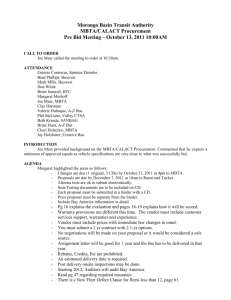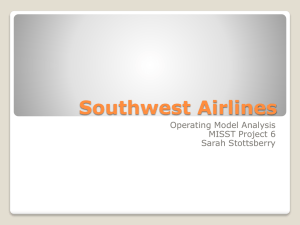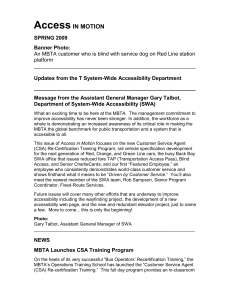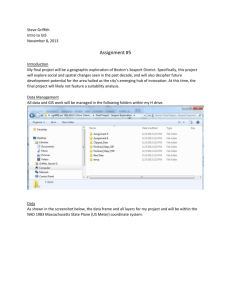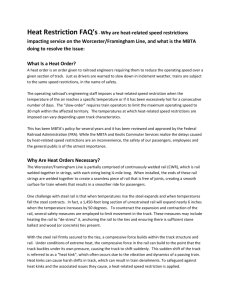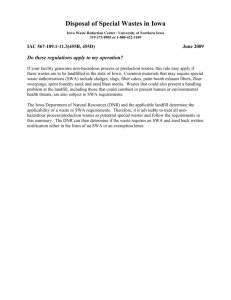SWA Initiatives (DOC)
advertisement
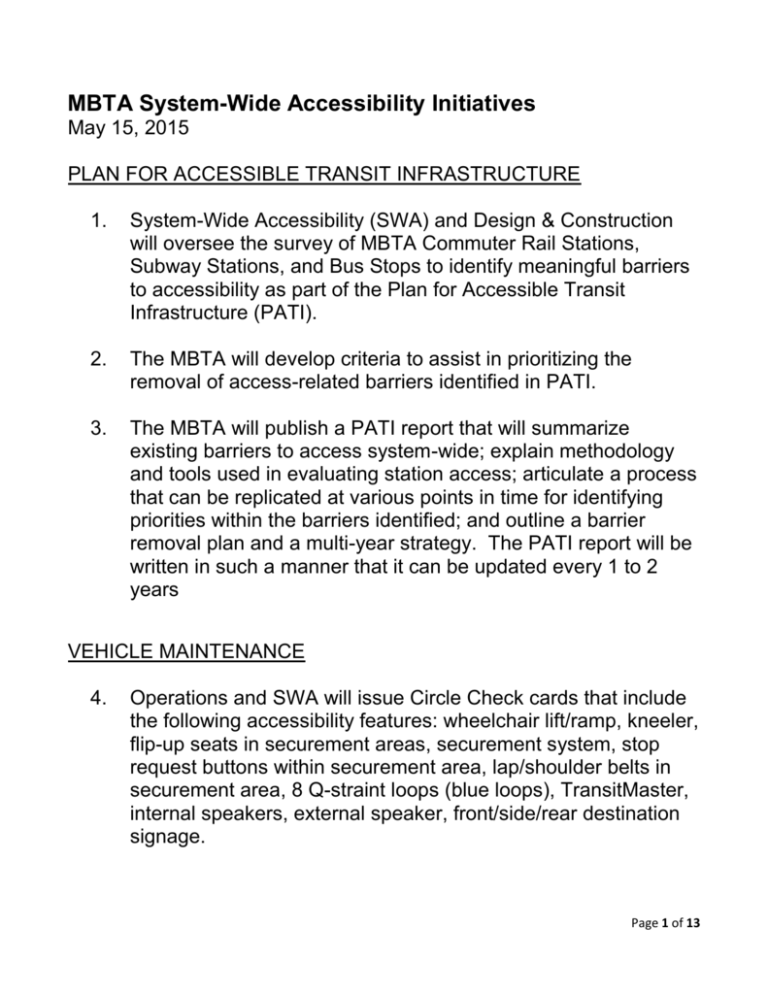
MBTA System-Wide Accessibility Initiatives May 15, 2015 PLAN FOR ACCESSIBLE TRANSIT INFRASTRUCTURE 1. System-Wide Accessibility (SWA) and Design & Construction will oversee the survey of MBTA Commuter Rail Stations, Subway Stations, and Bus Stops to identify meaningful barriers to accessibility as part of the Plan for Accessible Transit Infrastructure (PATI). 2. The MBTA will develop criteria to assist in prioritizing the removal of access-related barriers identified in PATI. 3. The MBTA will publish a PATI report that will summarize existing barriers to access system-wide; explain methodology and tools used in evaluating station access; articulate a process that can be replicated at various points in time for identifying priorities within the barriers identified; and outline a barrier removal plan and a multi-year strategy. The PATI report will be written in such a manner that it can be updated every 1 to 2 years VEHICLE MAINTENANCE 4. Operations and SWA will issue Circle Check cards that include the following accessibility features: wheelchair lift/ramp, kneeler, flip-up seats in securement areas, securement system, stop request buttons within securement area, lap/shoulder belts in securement area, 8 Q-straint loops (blue loops), TransitMaster, internal speakers, external speaker, front/side/rear destination signage. Page 1 of 13 5. SWA and Operations will run monthly reports summarizing all accessibility-related defects captured within MCRS 2, how many vehicles are held out of service because of reported defects, and how quickly reported defects are repaired. BUS OPERATIONS 6. Operations and SWA will issue a new rule regarding when/how a high-floor bus is taken out of service if its lift is determined to be inoperable. 7. Operations and SWA will issue guidelines regarding when, and for how long, a vehicle can remain in service if the vehicle has a non-functioning accessibility feature. Whether, and to what extent, a vehicle can remain in service will depend on the nature of the non-functioning feature. 8. The MBTA will reprogram TransitMaster system on buses so it announces an operator’s badge number both audibly and visually. 9. The MBTA will designate at least four additional seats as Priority Seating seats on all fixed-route buses and Silver Line vehicles. 10. Operations and SWA will revise Priority Seating signage on new vehicles and vehicles being overhauled to improve the visibility of the signage and to ensure consistency across all modes. 11. Operations and SWA will install revised Priority Seating signage on new vehicles and vehicles being overhauled to improve the visibility of the signage and to ensure consistency across all modes. Page 2 of 13 12. The MBTA will develop, and post to its website, guidelines for designing and maintaining accessible bus stops that will include both minimum technical standards as well as options for further improving service, such as curb extensions. 13. Operations and SWA will revise and reissue policy regarding service animals to ensure consistency across all modes. EMERGENCIES 14. The MBTA will require SWA to have a role in the planning and evaluation of all emergency-preparedness drills organized by the MBTA. This protocol will include inviting customers with disabilitiese in such drills when members of the general public also have been invited to participate. 15. SWA and Operations will adjust training modules regarding emergency preparedness and customers with disabilities and incorporate these modules in Bus and Subway Recertification trainings for Bus Operators, CSAs and Motorpersons. 16. Operations and SWA will develop a standardized procedure for employees to follow when responding to common emergency diversions, including establishing a procedure for ensuring that shuttle locations are accessible and that customer communications during a diversion address the needs of customers with disabilities. 17. MBTA will require Operations to conduct quarterly audits of Stryker chairs to verify the presence and reliability of all Stryker chairs owned by the MBTA. 18. MBTA will procure additional emergency evacuation chairs to ensure presence on all Commuter Rail consists Page 3 of 13 VEHICLE ENGINEERING 19. SWA will reinstitute the Accessible Vehicle Ad Hoc Committee to solicit design feedback throughout procurement process of new Red/Orange/Green Line vehicles. AUTOMATED FARE COLLECTION 20. AFC and IT will install second CharlieCard target on all fare gates designated as accessible to people with disabilities. 21. The MBTA will develop a policy to include at least two accessible faregates at all new stations. Additionally, a second accessible faregate will be installed at stations undergoing renovations if deemed appropriate by Design & Contruction and SWA. STOP AND DESTINATION ANNOUNCEMENTS 22. Operations and SWA will issue a rule reminder to remind employees to make stop announcements on Subway. Additionally, Motorpersons Recertifications will be revised to include additional information regarding the importance of making stop announcements and the potential discipline associated with failing to make such announcements. 23. SWA and Ops will develop a protocol for how/when Bus Operators must announce stops if Transit Master is not working. 24. Operations and SWA will reissue rule that Bus Operators and Green Line Motorpersons are required to make external Page 4 of 13 announcements manually in the event that automated external announcements are not functioning. VERTICAL TRANSPORTATION 25. The MBTA will develop a system-wide elevator replacement plan. 26. Design and Construction will procure design of next set of replacement elevators. Number of units to be determined. 27. SWA will implement oversight program for Operation’s management of Kone maintenance contract using either internal staff or external consultants. 28. SWA will establish quarterly meetings between SWA, Design & Construction, and Operations to discuss elevator-related issues, including elevator reliability and design and construction projects 29. Design and Construction will finalize the design and construction of Phase 1 (2 new elevators in Burnham Building) of the plan to implement an accessible connection via elevators connecting Red and Orange Lines at Downtown Crossing. At least 2 addtional phases will be required to implement such a connection. 30. Design and Construction will finalize the design and construction of Harvard 821 replacement 31. Design and Construction will finalize the design and construction of Park 804 and 808 replacements Page 5 of 13 32. Design and Construction will finalize the design and construction of Central 861 replacement 33. Design and Construction will finalize the design and construction of Tufts 872, 879, 880 replacements. 34. Design and Construction will finalize the design and construction of Andrew 857, 858, 859 replacements 35. Design and Construction will finalize the design and construction of Alewife 813, 814, 815 replacements 36. Design and Construction will finalize the design and construction of Quincy Adams 805, 806, 807 replacements 37. Operations will enhance its procedure for notifying passengers of elevator outages to include posting outage information physically on affected elevators 1 week (or as soon as possible) in advance of any planned shutdowns (in addition to posting on mbta.com). 38. The MBTA will develop a system-wide escalator replacement plan. ACCESS TO STATIONS/FACILITIES 39. Operations and SWA will develop snow removal standards for bus stops and stations. 40. Operations, Real Estate and SWA will post on its website a list of all bus stops serviced by the MBTA, identifying the property owner of each stop (e.g. municipality, private owner, MBTA, etc.). Page 6 of 13 41. Operations will begin sharing monthly reports with impacted municipalitys' transportation and Police Departments regarding bus stops obstructed by illegally parked vehicles. 42. MBTA will partner with other organizations (e.g. MOD, Walk Boston, etc) to advocate for proper maintenance at bus stops. CUSTOMER COMPLAINT PROCESS 43. The MBTA will establish a procedure for handling accessibilityrelated customer complaints. This procedure will: identify the information that must be collected during intake; identify the circumstances under which a customer complaint requires further investigation; require supervisory staff to review and approve the content of all accessibility-related complaints during the intake phase; identify other roles/responsibilities of customer service staff and supervisory personnel; identify an Operations supervisor’s role and responsibilities when investigating access-related complaints; and set quality and timeliness standards for responding to customer complaints. 44. Customer Support Services Center and SWA will retrain customer service staff regarding the MBTA’s protocol for providing Braille schedules to customers. SUBWAY OPERATIONS 45. Operations will post on the MBTA’s website an updated inventory of emergency callbox locations. Page 7 of 13 46. Operations will develop specifications for Customer Assistance Areas at all Heavy Rail stations and prepare a timeline for installing them. 47. Real Estate will install at least one TeleTypwriter (“TTY”) phone in all Heavy/Light Rail stations where public pay phones are present. Signage and the MBTA website will identify the locations of the TTYs. 48. MBTA will revise daily station inspection lists to include the following access-related considerations: elevators, escalators, PA/VMS boards, call boxes, bridge plates, mobile lifts, detectable warning strips, unobstructed paths of travel, and fare gates designated as accessible to persons with disabilities 49. The MBTA will develop a plan for broadcasting audio and visual elevator/escalator announcements in Subway stations, and will determine required budget for implementation. TRAINING 50. When Phase II of the Bus Operations Recertification Training concludes, Operations will develop the curriculum for Phase III Bus Operations Recertification and will begin offering the training to Bus Operations personnel. The pace with which staff attend the training will be gradual and will be managed in such away to minimize dropped trips and/or overtime issues. 51. Operations and SWA will review the 8 hour ADA Recertification Program to determine if any updates are warranted. If Operations and SWA determine revisions are warranted, they will implement them accordingly. Page 8 of 13 52. Operations and SWA will review accessibility-related modules within Subway Recertifications to determine whether any revisions are warranted If Operations and SWA determine revisions are warranted, they will implement them accordingly. 53. SWA will develop an access-related training module for Senior Leadership to undergo upon hire/promotion and every three years thereafter. (Senior Leadership constitutes staff at Director level and above) INTERNAL ACCESS MONITORING 54. SWA's Internal Access Monitoring Program will update and revise its training program and materials 55. All monitoring forms will be converted from paper surveys to digital surveys 56. All policicies/procedures related to SWA's internal Access Monitoring Program will be reduced to writing 57. All Internal Access Monitoring Reports will be issued on a quarterly basis 58. SWA will require Internal Access Monitors to make same-day service requests for minor deficiencies related to equipment. Examples of such minor deficiencies include broken hand straps, dirty lap/shoulder belts, and missing priority seating signage, etc. 59. SWA’s Internal Access Monitoring Program will revise its protocol to include the monitoring of alternate service routes, implemented due to mass diversions and/or elevator outages. Page 9 of 13 COMMUNITY ENGAGEMENT 60. In concert with the Title 6 public participation plan, the MBTA will develop a public engagement plan for seniors and people with disabilities 61. Marketing and SWA will develop and implement a marketing campaign designed to highlight improvements to fixed-route access and to spread the message that access benefits all customers. 62. The MBTA will work with AACT and other disability stakeholder organizations to review the AACT MOU and will revise as needed to improve community engagement. MISC. DESIGN & CONSTRUCTION 63. SWA and Design & Construction will procure a contractor to revise the Design Guide to Access to reflect access-related updates in the law and to identify best practices in universal design. The Independent Monitor and/or a representative from the plaintiffs will be invited to review the proposals received in response to this RFP. The MBTA will complete the development of the Design Guide to Access. STATION UPGRADES 64. Design and Construction will complete construction of renovated Government Center Station to ensure full access to Blue and Green Line platforms. Page 10 of 13 65. Design and Construction will complete design for an accessible Auburndale Commuter Rail Station. 66. Design and Construction will reconstruct Mansfield Commuter Rail Station, including building an accessible connection between the Inbound and Outbound portions of station. 67. Design and Construction will reconstruct a fully accessible South Acton Commuter Rail Station. 68. Design and Construction will finalize the design of a fully accessible Winchester Commuter Rail Station. 69. The MBTA will consolidate and reconstruct BU West, St. Paul, Babcock and Pleasant St stations into two fully accessible Green Line Stations. 70. As part of the Casey Overpass project, MassDOT will construct a second accessible entrance to the Orange Line platform at Forest Hills Station. 71. Design and Construction will finalize the design of a fully accessible Wollaston Station. 72. Design and Construction will reconstruct a fully accessible Chelsea Commuter Rail Station. 73. Design and Constructionwill fix the mini-high platform at Ashmont Station to allow passengers with disabilities to board the Trolley to the extent it is technically feasible 74. Design and Construction will replace the ramp connecting subway platforms and busway at JFK/UMASS. Page 11 of 13 75. Design and Construction will procure a survey and conceptual design for a fully accessible Oak Grove Station 76. Design and Construction will procure a survey and conceptual design for a fully accessible Newton Highlands Station. COMMUTER RAIL 77. SWA, RROps and Keolis will develop a 4-8 hour training on providing appropriate service to customers with disabilities 78. SWA and RROps will standardize bridgeplate design to the greatest extent feasible TRANSIT POLICE 79. SWA and the Transit Police Academy will develop a training regarding providing appropriate service to people with disabilities INFORMATION TECHNOLOGY 80. MBTA will rebuild mbta.com, ensuring it is fully accessible 81. SWA will redesign content of "accessible srvices" portion of website to include history of access at MBTA, current goals regarding accessibility and options for community engagement 82. MBTA will issue policy that requires all files posted to mbta.com be accessible Page 12 of 13 83. MBTA will develop policy outlining which enterprise applications be tested for compliance with accessibility standards, and how that testing should be completed. MOBILITY MANAGEMENT 84. SWA will issue an RFP for travel instruction services for seniors and people with disabilities SYSTEM-WIDE ACCESSIBILITY 85. The MBTA will develop and issue a policy outlining when and how an MBTA project or initiative must be approved by SWA. Page 13 of 13
